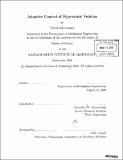Adaptive control of hypersonic vehicles
Author(s)
Gibson, Travis Eli
DownloadFull printable version (28.95Mb)
Other Contributors
Massachusetts Institute of Technology. Dept. of Mechanical Engineering.
Advisor
Anuradha M. Annaswamy.
Terms of use
Metadata
Show full item recordAbstract
The guidance, navigation and control of hypersonic vehicles are highly challenging tasks due to the fact that the dynamics of the airframe, propulsion system and structure are integrated and highly interactive. Such a coupling makes it difficult to model various components with a requisite degree of accuracy. This in turn makes various control tasks including altitude and velocity command tracking in the cruise phase of the flight extremely difficult. This work proposes an adaptive controller for a hypersonic cruise vehicle subject to: aerodynamic uncertainties, center-of-gravity movements, actuator saturation, failures, and time-delays. The adaptive control architecture is based on a linearized model of the underlying rigid body dynamics and explicitly accommodates for all uncertainties. Within the control structure is a baseline Proportional Integral Filter commonly used in optimal control designs. The control design is validated using a highfidelity HSV model that incorporates various effects including coupling between structural modes and aerodynamics, and thrust pitch coupling. Analysis of the Adaptive Robust Controller for Hypersonic Vehicles (ARCH) is carried out using a control verification methodology. This methodology illustrates the resilience of the controller to the uncertainties mentioned above for a set of closed-loop requirements that prevent excessive structural loading, poor tracking performance, and engine stalls. This analysis enables the quantification of the improvements that result from using and adaptive controller for a typical maneuver in the V-h space under cruise conditions.
Description
Thesis (S.M.)--Massachusetts Institute of Technology, Dept. of Mechanical Engineering, 2008. Includes bibliographical references (p. 105-109).
Date issued
2008Department
Massachusetts Institute of Technology. Department of Mechanical EngineeringPublisher
Massachusetts Institute of Technology
Keywords
Mechanical Engineering.